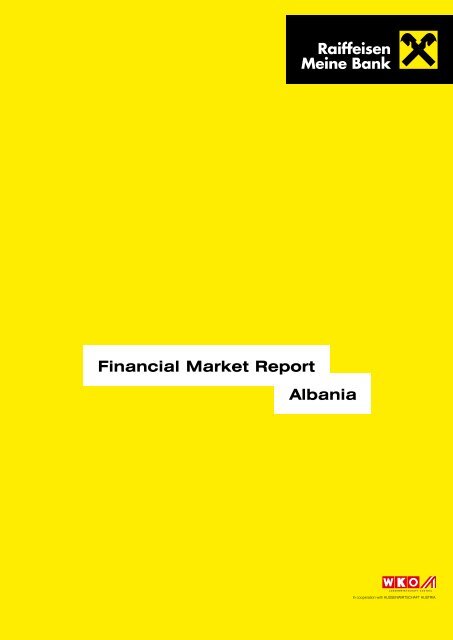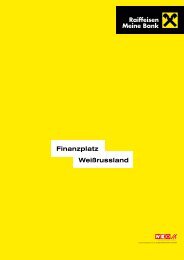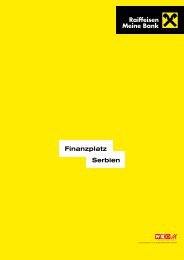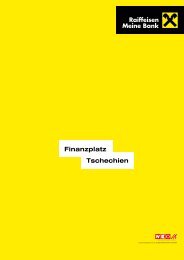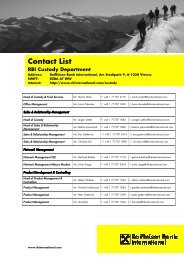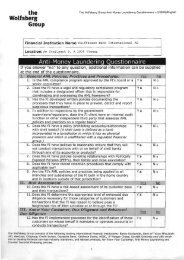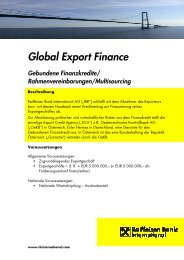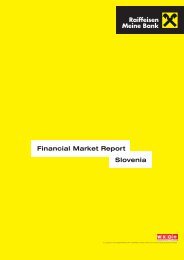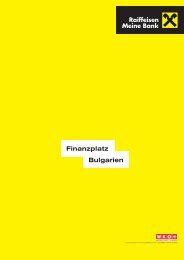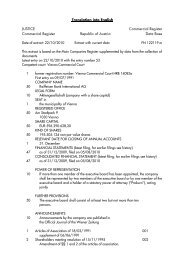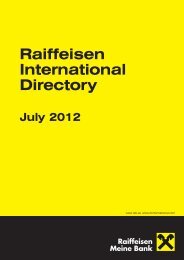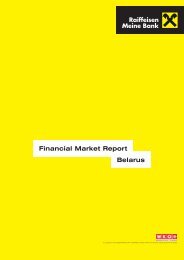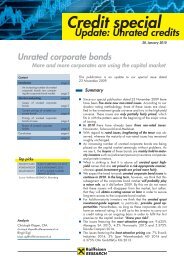Download - Raiffeisen Bank International AG
Download - Raiffeisen Bank International AG
Download - Raiffeisen Bank International AG
You also want an ePaper? Increase the reach of your titles
YUMPU automatically turns print PDFs into web optimized ePapers that Google loves.
Financial Market Report<br />
Albania<br />
AUSSENWIRTSCHAF T AUSTRIA<br />
In cooperation with AUSSENWIRTSCHAFT AUSTRIA.
Country Profile: Albania<br />
<strong>Raiffeisen</strong> Research. As in April 2013.<br />
The Albanian Financial Market<br />
Currency: Albanian lek (ALL)<br />
Gross Domestic Product and Budget 2011 2012 2013e 2014f<br />
Real GDP growth, % p.a. 3,1 2,0 2,0 3,5<br />
Nominal GDP, €bn 9,8 10,2 10,7 11,4<br />
Per capita GDP, PPP basis, € 7800,0 7900,0 8100,0 8400,0<br />
Growth in industrial output, % p.a. 3,0 3,0 3,0 3,0<br />
Consolidated budget deficit, % of GDP -3,5 -3,0 -3,0 -3,0<br />
Inflation and Employment<br />
Jobless rate, annual average, % 14 13,33 13,5 13,6<br />
Average monthly gross wage, € 321 345 347 358<br />
Consumer price inflation, annual average, % p.a. 3,5 2 2,5 3<br />
Balance of Trade and Current Account<br />
Goods exports, €bn 1,4 1,5 1,4 1,6<br />
Goods imports, €bn 3,9 3,8 3,5 3,5<br />
Current account deficit, €bn -1,1 -0,9 -1,0 -1,1<br />
Current account deficit, % of GDP -11,3 -8,8 -9,1 -9,2<br />
Foreign debt, % of GDP 23,6 24,5 24,3 26,4<br />
1. The Political Situation and Economic in Albania .......................................... 4<br />
2. Company Law ..................................................................... 5<br />
3. Taxation and Legislation ............................................................. 7<br />
4. Privatization ....................................................................... 9<br />
5. Arbitration ....................................................................... 10<br />
6. Subsidies and Support ............................................................. 11<br />
7. Risk Mitigation and Finance ......................................................... 14<br />
8. Payment and Account Services at <strong>Raiffeisen</strong> <strong>Bank</strong> Sh. a. ................................. 19<br />
9. <strong>Raiffeisen</strong> <strong>Bank</strong> Sh. a. .............................................................. 22<br />
10. Your <strong>International</strong> Business Specialists at <strong>Raiffeisen</strong> <strong>Bank</strong> Sh. a.<br />
and the Global <strong>Raiffeisen</strong> Network .................................................... 23<br />
Rates of Exchange and Interest Rates<br />
Local currency/US$ (average) 100,8 108,2 103,4 104,0<br />
Local currency/€ (average) 140,3 139,0 138,5 138,3<br />
3-month money market rate (TRIBOR), average, % 7,0 6,9 6,5 6,3<br />
Country Ratings<br />
S&P B+<br />
Moody‘s<br />
B1<br />
Fitch<br />
not rated<br />
Important:<br />
Despite thorough research and the use of reliable sources, we cannot accept responsibility or liability for the<br />
completeness or accuracy of this brochure’s contents. The purpose of this brochure is to give you initial, general<br />
information to help you develop business relationships in Albania. The content of this brochure does not constitute<br />
any form of advice or offer or invitation to make an offer.<br />
Prepared in cooperation with AUSSENWIRTSCHAFT AUSTRIA at WKÖ (the Austrian Federal<br />
Economic Chamber).<br />
Sources:<br />
<strong>Raiffeisen</strong> <strong>Bank</strong> <strong>International</strong> <strong>AG</strong><br />
WKO: Albania Country Report of the AUSSENWIRTSCHAFT AUSTRIA<br />
Bibliography: Skok B., Gotwald A., Jungreithmeir T. (2008), Förderinstrumente für Südosteuropa (Subsidy and<br />
Support Instruments for Southeastern Europe). Vienna: Linde Verlag Wien.<br />
Copy deadline: May 2013.<br />
2<br />
3
1. The Political and Economic<br />
2. Company Law<br />
Situation in Albania<br />
Good Adjustment<br />
Over the years, Albania has developed into a modern market economy with, among other things, a move<br />
away from agriculture to services and construction. The economy grew on average by approx. 4% annually<br />
in the years 2008-2012. Albania was one of the few countries in Europe to register growth in GDP even<br />
during the financial crisis of 2009. Albania has strong trade links with Greece and Italy and so the problems<br />
in these two countries are also having an impact on the development of its economy. It is nonetheless<br />
anticipated that in the next few years growth rates will more or less return to the levels achieved before the<br />
financial crisis. The <strong>International</strong> Monetary Fund (IMF) predicts growth of 1.7% for the year 2013 and the current<br />
consensus is that it will be 2.2%. Both are more or less in line with our estimate of 2%. The main reason<br />
for the growth in the economy in 2012 was the high demand from abroad, with investments already made<br />
in the energy sector or in infrastructure, for example, also contributing to growth. This led to a reduction in<br />
the historical dependence on money transfers from emigrants and on construction.<br />
Despite some significant improvements in recent years, parts of the infrastructure, energy and water supply,<br />
and the road and rail network are still in a very poor state. On the other hand, the banking system is on a<br />
par with those in Western Europe. The government has developed a reform package to attract increased<br />
foreign investment. Albania is also party to the Central European Free Trade Agreement, which has set itself<br />
the target of dismantling customs duties and abolishing non-tariff trade barriers within the signatory countries.<br />
Albanian citizens have been able to enter the Schengen area without a visa since 15 December 2010.<br />
Last year also saw increased diversification in trade relations, with a reduction in the still very strong trade<br />
links with Italy and Greece and stronger trade relations with countries such as Germany, Turkey, and China.<br />
The EU Commission regularly issues reports on the political and economic progress of countries that are<br />
potential candidates for EU membership. According to these reports, as of 22 March 2013, Albania has<br />
made progress but further efforts are required before the country can successfully apply for membership.<br />
One of the requirements, for example, is the holding of elections by European standards, something which<br />
Albania can demonstrate in the parliamentary elections in 2013.<br />
The political system in Albania is still being developed. Prime Minister Berisha‘s Democratic Party (DP) has<br />
been in power for 8 years and will also seek a further mandate from the electorate in 2013 to complete the<br />
infrastructure projects it has already begun. The Socialist Party (SP) opposition, led by the former Mayor of<br />
Tirana, Edi Rama, will once again seek to persuade voters that a change of government will stimulate economic<br />
growth. Both parties, however, share the wish to join the EU and so efforts will continue to be made<br />
in this direction whatever the outcome of the elections.<br />
Forming a company<br />
Albania’s economic development depends on foreign investment. Not only is foreign capital important; so<br />
too is business know-how. A modern foreign investment act based on World <strong>Bank</strong> guidelines and enacted<br />
in 1993 (Law No. 7764) makes it possible to form companies that are 100% foreign-owned, and whose profits<br />
can be transferred out of Albania. Foreigners can own ordinary land, but they can only own building land<br />
if the value of the investment is at least three times the value of the land. Albanian subsidiaries can own land<br />
without any restrictions. The land register is far from reliable, so one must carefully check who really owns<br />
a property. A new companies act has been in force since 2007. In practice, setting up a branch (for which<br />
the same accounting rules apply as to a subsidiary) or a representative office (which is not allowed to carry<br />
on any business activity) is a possible alternative to, or preliminary stage of, forming a company (which will<br />
usually be a limited liability company). In these cases, the same registration requirements apply, in theory<br />
at least. According to Law No. 9723 (dated 3 May 2007, and which came into force on 1 September 2007)<br />
concerning the National Registration Centre (NRC), new entities are to be registered with the NRC. The<br />
list of documents required for the initial registration of a new company with the NRC will depend on the<br />
particular company’s legal form.<br />
Generally, the following documents will be required to register a new company with the NRC:<br />
• an application form signed by the company’s legal representatives or by the authorized persons;<br />
• the memorandum and articles of association signed in the presence of a notary public;<br />
• the document that specifies the company’s boards and bodies if not included in the above articles.<br />
The following documents will be required to register a branch or representative office with the NRC:<br />
• an application form signed by the company’s legal representatives or by the authorized persons;<br />
• the memorandum and articles of association of the parent company and all amendments thereto;<br />
• a document proving the foreign entity’s registration in its country of domicile;<br />
• a document evidencing the good standing of the foreign legal entity issued no more than 90 days before<br />
the date of application, and which states the date of registration, other relevant dates, and whether the<br />
entity is in bankruptcy or liquidation;<br />
• if the foreign entity has been active for more than one year, its balance sheet for the most recent financial<br />
year prepared in accordance with the standards applicable in the respective foreign country;<br />
• a resolution by the competent body of the foreign legal entity regarding the setting up of a branch or<br />
representative office in Albania; if the person filing the application is also the competent body authorized<br />
to act alone on the foreign legal entity’s behalf, the registration application form will subsequently serve<br />
as a replacement for the relevant documents;<br />
• the document appointing the branch or office manager if the appointment is not included in the above<br />
resolution.<br />
Completion of the registration process and the issued registration certificate constitute proof of the<br />
applicant‘s business registration, fiscal registration and registration with the social insurance, health insurance<br />
and labour inspection authorities. All documents must be translated into Albanian and notarized.<br />
4<br />
5
3. Taxation and Legislation<br />
The minimum capital required to form a limited liability company (sh.p.k.) is ALL100 (approx. €0.75). The<br />
minimum capital required to form a joint stock company by way of a private offering is ALL2,000,000<br />
(approx. €14,652). The minimum capital required to form a joint stock company by way of a public offering<br />
is ALL10,000,000 (approx. €73,650). In addition, there will be lawyers’, notaries’ and registration fees, totalling<br />
about €1,000 to €2,000. From the date of the new act coming into force, share capital need no longer<br />
be paid in. Forming a company will take about one to two months. The actual formation process can be<br />
carried out relatively simply in one place (one-stop-shop system).<br />
Company taxation<br />
There has been a flat rate of tax (income tax, corporate tax) of 10% since 1 January 2008.<br />
Tax is assessed on the basis of annual profit.<br />
VAT/VAT number<br />
In 1996, 20% VAT was introduced on paid supplies, services and imports. When machinery is imported for<br />
investment purposes, the VAT is only payable after six months. Since 2011, and for the first time in Albania,<br />
there has been a reduced VAT rate of 10% on medication and medical services. Companies that are not<br />
registered for VAT do not have the option of getting a rebate on the value-added tax.<br />
Input tax deduction<br />
Input tax deduction is theoretically possible in accordance with the basic model. In practice, there are few<br />
rebates and those that do exist are severely delayed, but it is possible to make arrangements with the<br />
Albanian authorities regarding offsetting this against other taxes due.<br />
Excise tax<br />
Luxury goods such as beverages, coffee, and fuel are subject to excise tax.<br />
Double taxation agreement<br />
A double taxation agreement with Austria has been in force since 1 January 2009.<br />
Customs regulations<br />
A new customs act (Law No. 8449 of 27 January 1999) and a new ministerial order on customs (Ministerial<br />
Order No. 205 of 13 April 1999) entered into force in 1999. As a result, Albania’s customs procedures are,<br />
in principle, in line with EU customs procedures. The combined nomenclature applies, but the details have<br />
yet to be harmonized with international regulations. Rates of duty range between 0 and 10%. The most<br />
important categories are 0, 2, and 10%.<br />
6 7
4. Privatization<br />
There are no export duties.<br />
The CEFTA free-trade agreement is in force with the countries in the region. It provides for the duty-free<br />
importation of most of the products manufactured in the region. A duty-free agreement with the EU is<br />
in place as part of the interim Stabilization and Association Agreement and has been in force since 1<br />
December 2006. Since 1 January 2011, industrial products produced in the EU can be imported to Albania<br />
as duty-free products. There are plans to further cut duties for agricultural, as well as some other products<br />
All foodstuffs imported to Albania must be shipped with a certificate of quality.<br />
Building companies that bring machinery and equipment into Albania within the scope of investments or<br />
for their own use do not have to pay duty on those items. There are also exceptions for oil-producing companies<br />
and within the scope of humanitarian aid. No ATA carnets are issued for Albania. Equipment used<br />
professionally can be imported duty free on a temporary basis for up to six months. To do so, one must<br />
submit a letter of confirmation, in English and in duplicate, which provides personal information about the<br />
traveller, along with the purpose and duration of their visit and a list of the items he or she is bringing together<br />
with precise information about the value of each item. The basis for customs clearance is the cost of<br />
goods, including transportation and insurance costs, commission payments, packaging costs, and other<br />
costs associated with this. Temporary duty-free import may be repeated and extended. You must contact<br />
the Albanian General Directorate for Customs (http://www.dogana.gov.al/) in order to do this.<br />
The relevant contacts in Albania are the MINISTRY OF ECONOMIC AFFAIRS Ministria e Ekonomisë<br />
Bulevardi Deshmoret e Kombit 2, Tirana Phone: +355-4-222 2655 mvokshi@mete.gov.al www.mete.gov.al<br />
and the Albanian Agency for Business and Investments (ALBINVEST)<br />
http://www.albinvest.gov.al/<br />
8 9
5. Arbitration<br />
6. Subsidies and Support<br />
Albania ratified the Convention on the Recognition and Enforcement of Foreign Arbitral Awards (the New<br />
York Convention) in 2000. In it, the contracting states undertake to recognize and enforce arbitral awards<br />
made in another contracting state.<br />
Consequently, the jurisdiction of the <strong>International</strong>es Schiedsgericht der Wirtschaftskammer Österreich<br />
(<strong>International</strong> Arbitral Centre of the Austrian Federal Economic Chamber), the <strong>International</strong> Chamber of<br />
Commerce (ICC) or another arbitrator can be agreed in your contract with an Albanian counterparty.<br />
Unlike the judgements of state courts, arbitral awards can be enforced practically worldwide. For a dispute<br />
to be settled by a court of arbitration, its jurisdiction must have been agreed upon beforehand in writing. It<br />
is therefore advisable to include an arbitration clause in the contract with your foreign counterparty.<br />
The Austrian Federal Economic Chamber offers institutional arbitration as a service through the <strong>International</strong><br />
Arbitral Centre of the Austrian Federal Economic Chamber.<br />
EU subsidies and support<br />
The current EU support programme for Albania is the extensive IPA (Instrument for Pre-Accession<br />
Assistance). The IPA has been allocated a total budget of €11.5 billion for the years 2007 through<br />
2013. Since 1 July 2007, it has replaced the other pre-accession instruments (PHARE, ISPA und SAPARD)<br />
and the CARDS assistance programme for the Western Balkans. However, expiring calls for proposals still<br />
exist under the old programmes.<br />
The purpose of the IPA is to help EU candidates gradually come into line with EU standards and the EU<br />
political system. It is aimed at the EU accession candidates whose status has already been recognized<br />
(Croatia, Macedonia, Turkey) and the prospective applicants for EU membership (Albania, Bosnia and<br />
Hercegovina, Kosovo, Montenegro and Serbia).<br />
The IPA is made up of five components:<br />
The arbitration clause of the <strong>International</strong> Arbitral Centre of the Austrian Federal Economic Chamber reads<br />
as follows (versions are also available in the languages that are most important for Austrian exporters):<br />
‘All disputes arising out of this contract or related to its violation, termination or nullity shall be finally settled<br />
under the Rules of Arbitration and Conciliation of the <strong>International</strong> Arbitral Centre of the Austrian Federal<br />
Economic Chamber in Vienna (Vienna Rules) by one or more arbitrators appointed in accordance with<br />
these Rules.’<br />
Useful agreements to supplement this arbitration clause:<br />
1. Support for transition and<br />
institution-building<br />
2. Cross-border cooperation<br />
3. Regional development<br />
4. Human resources development<br />
5. Rural development<br />
(<br />
(<br />
><br />
(<br />
(<br />
><br />
For all beneficiary countries<br />
For candidate countries only<br />
• the number of arbitrators shall be .......................... (one or three);<br />
• the applicable law shall be ............................;<br />
• the language used during arbitration proceedings shall be ......................................<br />
Detailed information:<br />
<strong>International</strong>es Schiedsgericht der Wirtschaftskammer Österreich<br />
<strong>International</strong> Arbitral Centre of the Austrian Federal Economic Chamber<br />
Dr. Manfred Heider; Phone: +43-5-90 900-4398; Fax: +43-5-90 900-216.<br />
E-mail: arb@wko.at; Internet: wko.at/arbitration<br />
• ICC Austria, <strong>International</strong> Chamber of Commerce<br />
Maximilian Burger-Scheidlin; Phone: +43-5-90 900-3701; Fax: +43-5-90 900-3703;<br />
e-mail: icc@wko.at; Internet: www.icc-austria.org.<br />
Since Albania is merely a prospective candidate country, it can only use funds from the first two components.<br />
A total of €594.4 million has been earmarked for Albania for the period 2007 – 2013. The lion’s share<br />
(€528.3 million) has been earmarked for component 1. €66.1 million has been earmarked for component 2.<br />
Details of the two applicable IPA components:<br />
Component 1: Support for transition and institution-building<br />
The aim is to develop a country’s institutional infrastructure (e.g. create an effective public administration)<br />
and set up structures for monitoring EU technical standards, environmental standards, transport regulations,<br />
working conditions, food safety, consumer protection and testing and certification institutes.<br />
How companies can participate<br />
The programme is basically aimed at the administrations of EU accession candidates. Funds are allocated<br />
locally on a decentralized basis by Delegations of the European Union following scrutiny by the<br />
EU. Companies can benefit from IPA support indirectly through the granting of orders for services, sup-<br />
10 11
plies (IT equipment, laboratory equipment, etc.) or works on the basis of open calls for proposals for IPA<br />
support.<br />
Examples of orders for institution-building<br />
• technical studies and preliminary work on IT systems and solutions;<br />
• seminars and workshops on <strong>International</strong> Accounting Standards for officials, professional associations<br />
and universities;<br />
• preparation of information material in the country’s language on CE marking for products;<br />
• development of software systems (e.g. for public water management);<br />
• training of municipal waste management experts;<br />
• supply of laboratory equipment for veterinary and food testing;<br />
• supply of hardware and software for ministries, security agencies, health services, financial administrations<br />
(e.g. waste management information systems).<br />
Component 2: Cross-border cooperation<br />
There are plans for cross-border projects with neighbouring countries, including, for instance, enhancing<br />
regional integration (by improving economic structures, transport networks and infrastructures), reducing<br />
environmental pollution, improving education and the labour market, economic cooperation, social and<br />
cultural exchanges, strengthening regional identities.<br />
How companies can participate<br />
As in the case of component 1, by providing services, supplies and works on the basis of open calls for<br />
proposals.<br />
Submitting applications, application deadlines<br />
Calls for proposals take place continuously. Calls for proposals and information about making applications<br />
are published on the EuropeAid website, and they are also published on the websites of the Delegations<br />
of the European Union to the beneficiary countries.<br />
Link to EuropeAid<br />
https://webgate.ec.europa.eu/europeaid/onlineservices/index.cfm?ADSSChck=1264761231660&do=<br />
publi.welcome<br />
Link to the Delegation of the European Union to Albania: http://www.delalb.ec.europa.eu/.<br />
Government subsidies and support in Albania<br />
• An act regulating foreign investment has been in force since 1994. Under this act, investors can invest<br />
in any area of the economy and can own up to 100 per cent of a company.<br />
• Since 2005, an act governing the manufacturing and services sector has been in force that regulates the<br />
state subsidies system.<br />
• The agricultural and fishing sectors are the only sectors excluded from subsidies.<br />
• Up to 100 per cent of the VAT on machinery and equipment can be refunded if it is used for a business<br />
activity and taxable revenues are generated.<br />
Subsidized leasing<br />
• Investors can lease state-owned land and buildings at below normal market prices.<br />
• In the manufacturing sector, the discount will depend on the amount of the investment and the number<br />
of new jobs created. Lease instalments will be reduced by between 5 and 50 per cent.<br />
Investment support in the tourism industry<br />
• The so-called ‘favoured persons’ named by the Ministry of Tourism, Culture, Youth and Sports have been<br />
receiving special investment support since 1993.<br />
• Investors granted this status are exempted from customs and excise duties on imported investment<br />
goods if they serve the construction, renovation or enlargement of hotels, motels or vacation complexes<br />
(the same applies to restaurants, shops, sports centres and thermal spas).<br />
• Tax exemptions apply for five years from the time the investment is completed.<br />
• Profit tax is reduced by 50 per cent for the subsequent five years.<br />
Investment incentives in the energy sector<br />
• Exemption from duty on investments in plant and imported machinery for generating electricity with a<br />
capacity of over 5 MW fired by liquid or solid fuels.<br />
• Refund of customs and excise duties on imported fuels used in the generation of electricity.<br />
Further information<br />
Contact at the <strong>Raiffeisen</strong> Network <strong>Bank</strong>: <strong>International</strong> Desk<br />
AIDA Albanian Investment<br />
Development Agency<br />
Telefon: +355 (0) 42251001<br />
E-Mail: info@aida.gov.al<br />
Internet: www.aida.gov.al<br />
Steuerbegünstigungen / Leasing<br />
General Tax Department<br />
Telefon: +355 / 4 / 227 68 00<br />
E-Mail: artur.papajani@tatime.gov.al<br />
Internet: www.tatime.gov.al<br />
Investitionsanreize im Energiesektor<br />
General Department of Customs<br />
E-Mail: zvdrejtoradministrativ@dogana.gov.al<br />
Internet: www.dogana.gov.al/<br />
Investitionsbegünstigungen im Tourismussektor<br />
Ministry of Tourism, Culture, Youth and Sports<br />
Telefon: +355 / 4 / 2222 508<br />
E-Mail: informacion@mtkrs.gov.al<br />
Internet: www.mtkrs.gov.al<br />
Tax concessions<br />
12 13
7. Risk Mitigation and Finance<br />
Guarding against investment and<br />
export risks abroad<br />
aws (Austria Wirtschafts Service GmbH = the federal government’s promotion agency)<br />
aws provides guarantees to protect Austrian companies against financial risks arising from their equity<br />
investments abroad within the scope of Ost-West-Fonds (East-West Fund) guarantees.<br />
Two kinds of protection are available: the direct guarantee and the finance guarantee (with or without risk<br />
sharing).<br />
Finance Guarantee<br />
An aws finance guarantee safeguards the bank by providing protection against the investor’s financial risk<br />
(loan loss caused by the Austrian company’s insolvency). A finance guarantee covers up to 80 per cent<br />
of the loan.<br />
Austrian Company<br />
Loan of €70<br />
Finance Guarantee<br />
for<br />
80% of Loan,<br />
i.e. €56.<br />
The Direct Guarantee<br />
An aws direct guarantee provides protection against the possible failure (insolvency or similar circumstances)<br />
of an equity investment project. aws undertakes to provide a specific capital sum up to the maximum<br />
guaranteed amount.<br />
Investment of €100<br />
BANK<br />
Austria<br />
Abroad<br />
Austrian Company<br />
Direct Guarantee of €50<br />
Finance guarantee<br />
to provide cover against credit risk<br />
Investment Target<br />
Investment of €100<br />
Austria<br />
Chart 2: Finance Guarantee Process<br />
Direct guarantee<br />
to cover project risk<br />
Abroad<br />
In the case of large enterprises, aws guarantees up to one third of a project’s value. The guarantee will cost<br />
SMEs from 0.3 per cent of the guaranteed outstanding loan amount per half year. In the case of large<br />
enterprises, the guarantee fee will be set in line with the market.<br />
Finance Guarantee with Risk Sharing or Combination of Direct Guarantee and Finance<br />
Guarantee<br />
Investment Target<br />
Chart 1: Direct Guarantee Process<br />
aws guarantees up to 50 per cent of the amount invested should a project in another country fail. The guarantee<br />
will cost SMEs 0.5 per cent of the guaranteed outstanding loan amount per half year.<br />
In the case of large enterprises, the maximum guarantee is one third of the value of the project. The guarantee<br />
fee will be set in line with the market.<br />
It is possible to supplement a finance guarantee with protection against the financial risk associated with an<br />
equity investment project in another country (finance guarantee with risk sharing). If the equity investment<br />
project fails, aws takes on the role of financier, offering the investor a cheaper form of finance (soft<br />
loan). Alternatively, it may offer the investor a settlement on a present value basis to allow early repayment<br />
of the loan. It is important to note that aws will only agree to risk sharing if it is ensured that the Austrian<br />
parent company is not in a position to deliberately make the equity investment fail (e.g. by charging excessively<br />
high internal prices).<br />
14<br />
15
Austrian Company<br />
Risk Sharing<br />
OeKB-Exportservice (www.exportservice.at) or your primary banking provider can tell you which form of<br />
guarantee is best for you.<br />
Investment of €100<br />
Loan of €70<br />
BANK<br />
Finance Guarantee<br />
for 80%<br />
of Loan<br />
Finance Guarantee with Risk Sharing<br />
to cover the credit risk and project risk<br />
Austria<br />
Abroad<br />
OeKB’s export financing scheme offers access to funds to pay for exports and equity investments<br />
abroad. This export financing scheme is available to Austrian and foreign commercial banks acting as the<br />
source of funds and is offered to companies via those banks within the scope of their export transactions<br />
and investments abroad.<br />
The prerequisites for this form of financing are:<br />
• a federal guarantee under the Ausfuhrfördergesetz (AFFG: Export Financing Promotion Act); or<br />
• the assumption of liability by a credit insurer within the meaning of AFFG; and<br />
• an aws (Austria Wirtschaftsservice GmbH) guarantee; or<br />
• the assumption of liability by an international organization within the meaning of AFFG; and<br />
that funding the underlying supplies/services will directly or indirectly help improve Austria’s current<br />
account or is in Austria’s interest.<br />
Investment Target<br />
Chart 3: Finance Guarantee with Risk Sharing Process<br />
The guarantee will cost SMEs 0.3 per cent of the guaranteed outstanding loan amount per half year plus<br />
another 0.2 per cent per half year for risk sharing. In the case of large enterprises, the guarantee fee will<br />
be set in line with the market.<br />
Link: www.awsg.at<br />
Low-interest finance, credit for internationalization projects:<br />
OeKB (Oesterreichische Kontrollbank <strong>AG</strong>)<br />
Good risk management and attractive sources of funds are essential if companies are to achieve sustainable<br />
success as exporters and when investing abroad. OeKB offers federal export guarantees and OeKB<br />
funding through a company’s primary banking provider, in this way providing instruments that strengthen<br />
Austrian companies and their partners in the global competitive environment.<br />
By issuing and processing export guarantees, OeKB thus acts as the Republic of Austria’s export credit<br />
agency (ECA).<br />
Export guarantees protect companies against default risks (whether caused by economic or political<br />
events) when exporting abroad, and export guarantees provide protection against political risks when<br />
investing abroad.<br />
In addition, federal export guarantees provide attractive access to funds to pay for export and investment<br />
transactions.<br />
Export guarantees are available to any large, medium-sized or small enterprise if the guaranteed transactions<br />
help improve Austria’s current account or are in Austria’s interest.<br />
ERP Fund<br />
The ERP Fund is a fund with a separate legal personality that has been affiliated with aws (Austria<br />
Wirtschaftsservice) since 2002.<br />
Low-interest advances with grace periods of several years are available within the scope of ERP loans:<br />
The ERP <strong>International</strong>ization Programme for Direct Investments Abroad<br />
• Target group: Austrian SMEs, large enterprises within the de minimis limits (present value of loan not<br />
more than €200,000 within 3 years).<br />
• Support for: equity and other investments that will improve the applicant’s strategic position.<br />
• Equity and other investments in the following countries: Albania, Algeria, Argentina, Bosnia and<br />
Hercegovina, Brazil, China, Croatia, Egypt, India, Indonesia, Iran, Korea, Libya, Malaysia, Morocco,<br />
Macedonia, Mexico, Montenegro, Pakistan, Russia, Saudi Arabia, Serbia, Sri Lanka, Thailand, Tunisia,<br />
Turkey, the Ukraine.<br />
• Terms and conditions of ERP loans<br />
– Maximum loan: €7.5 million<br />
– Duration: 6 years<br />
– Period of utilization: 0.5 years<br />
– Grace period: 2 – 3 years, interest rate of 0.5% p.a. (fixed)<br />
– Redemption period: 3 – 4 years, interest rate of 1.50% p.a. (fixed)<br />
16 17
8. Payment and Account Services at<br />
<strong>Raiffeisen</strong> <strong>Bank</strong> Sh. a.<br />
– In a number of programmes, longer grace periods and longer redemption periods are also on offer:<br />
sunrise industries within the technology programme, regional programme with a longer duration.<br />
– Interest and redemptions are recorded on an accrual basis.<br />
– Processing fee: 0.9% of the ERP loan.<br />
– In addition to these costs, there will also be the guaranteeing bank’s guarantee fee.<br />
Guarantee<br />
Trust Money<br />
• Projects eligible for support<br />
– investments in:<br />
– manufacturing facilities<br />
– setting up subsidiaries<br />
– acquisition of a qualifying holding (at least 25%)<br />
• Costs that can be subsidized<br />
– capital contributions<br />
– shareholders’/members’/partners’ loans<br />
– cost of acquiring an equity investment<br />
– costs directly associated with investments<br />
ERP Loan<br />
Austrian Company<br />
BANK<br />
Loan Agreement<br />
The KfW <strong>Bank</strong>ing Group (Kreditanstalt für Wiederaufbau, Frankfurt, Germany)<br />
KfW-<strong>Bank</strong> offers subsidized, fixed-rate loans to pay for investments carried out abroad in connection with<br />
internationalization projects of German companies or their subsidiaries or joint ventures with German<br />
partners (German stake > 25%). They can be obtained through partner banks (e.g. RZB). The following<br />
programmes come into question in connection with internationalization projects: Corporate Loans, the KfW<br />
Environmental Programme, KfW Capital for Jobs and Investment (all three programmes can be combined).<br />
Essentially, any investment can be financed (e.g. corporate acquisitions, investments in plant, machinery,<br />
land and buildings).<br />
Link: www.kfw-foerderbank.de/<br />
Chart 4: ERP Loan Process<br />
8.1. Cash management products<br />
Account Services<br />
Local Currency<br />
Foreign Currencies<br />
(LCY) LCY Deposits (FCY) FCY Deposits<br />
Residents 3 3 3 3<br />
Non-residents 3 3 3 3<br />
Interest on credit balances 3 3 3 3<br />
Overdrafts 3 3<br />
Cash Management: Local Products and Services<br />
Payments/Collections<br />
• Domestic payments LCY<br />
• Domestic payments FCY<br />
• Foreign payments FCY*<br />
• MT101<br />
• Salary Payment solutions<br />
• Direct Debit<br />
(Utility payments only; within the <strong>Bank</strong>)<br />
• Standing orders<br />
(between two retail accounts within the <strong>Bank</strong>)<br />
• Cheques<br />
• Cheque collection<br />
• Traveller’s cheques<br />
• USD denominated <strong>Bank</strong> Checks<br />
drawn on American <strong>Bank</strong>s<br />
• Cash payments / withdrawals LCY<br />
• Cash payments / withdrawals FCY<br />
• Purchase & Sales of FCY<br />
• Visa Electron Debit Card<br />
• Money Gram<br />
* however, subject to regulations of <strong>Bank</strong> of Albania<br />
Cash Management: Group Products and Services<br />
• Cash Management <strong>International</strong> (CMI)<br />
• CMI@Web<br />
• <strong>International</strong> Account Reporting<br />
• <strong>International</strong> Disbursement Service*<br />
• Payments within RBAL & RBKO standardization<br />
• Cross-border Margin Pooling<br />
• Intra-group Payments<br />
Electronic <strong>Bank</strong>ing<br />
• MultiCash<br />
Liquidity Management<br />
• Account sweeping<br />
• Cash Collection<br />
• Margin pooling<br />
• Forex<br />
• Central Conversion Solution<br />
• SWIFT for corporates (SCORE)<br />
18 19
8.2. Local & Foreign Exchange Regulations<br />
Current Accounts<br />
8.3. Clearing Mechanisms<br />
Settlement<br />
• Local and foreign corporate customers are allowed to maintain domestic and foreign currency accounts<br />
in local banks.<br />
Domestic Payments<br />
• There are no limitations with regard to domestic payments, either in LCY or FCY.<br />
• <strong>Bank</strong> requires the source of revenues and reasonable justification for the domestic transfer.<br />
Foreign Payments<br />
• Description:<br />
• Type,<br />
Transaction value,<br />
Settlement cycle:<br />
All commercial banks hold clearing accounts with the <strong>Bank</strong> of Albania.<br />
Payments above ALL 1.5 million are performed through AIPS (Albanian<br />
Interbank Payments System), a RTGS system, which is directly connected to<br />
SWIFT Y-COPY Service. Payments below ALL 1.5 million are performed through<br />
AECH (Automated Electronic Clearing House).<br />
• In case of commercial payments, companies have to present to the bank at the time of transfer supporting<br />
documents such as invoices, pro-forma invoices, contracts, customs clearance acts, a decision<br />
taken from Management Board, for fund transfers etc. In case of advance payments, a pro-forma invoice<br />
must be handed to the bank, while the customs clearance act should be presented at the bank within<br />
3 months from the day of the transfer.<br />
• Transfer of capital outside Albania can also be performed with the presentation of some documents<br />
including a certificate issued from the Tax Office declaring the company is free from any liabilities<br />
towards the government.<br />
• There are no restrictions with regard to incoming foreign payments.<br />
• Individuals can transfer freely without any limit restriction but they <strong>Bank</strong> requires a reasonable justification<br />
document for the transaction.<br />
Cash Payments / Withdrawals<br />
• Residents and non-residents can perform and receive cash payments in local and foreign currency<br />
(Foreign payment orders are subject to the regulations of the <strong>Bank</strong> of Albania).<br />
• <strong>Bank</strong> requires advance notice for large amounts and commissions may apply.<br />
• <strong>Bank</strong> requires the source of revenues and reasonable justification for the cash transaction.<br />
* however, rwstrictions due to local regulations<br />
20 21
9. <strong>Raiffeisen</strong> <strong>Bank</strong> Sh. a.<br />
10. Your <strong>International</strong> Business<br />
Specialists at <strong>Raiffeisen</strong> <strong>Bank</strong> Sh. a.<br />
and the Global <strong>Raiffeisen</strong> Network<br />
Assets, €m 2,300<br />
Branches 105<br />
Staff 1,400<br />
<strong>Raiffeisen</strong> <strong>Bank</strong> is the largest bank in the country, holding the number one position in all major key performance<br />
indicators. <strong>Raiffeisen</strong> has been represented in the Albanian market since 2004 by <strong>Raiffeisen</strong> <strong>Bank</strong><br />
Sh.a., which was founded in 1992 as <strong>Bank</strong>a e Kursimeve i Shqipërisë. The bank‘s loan portfolio was more<br />
than € 1 billion at the end of 2011, while deposits at the same period amounted to € 2 billion.<br />
<strong>Raiffeisen</strong> <strong>Bank</strong> offers the full range of banking products and services in the key business sectors in which<br />
it operates, namely private individuals, micro, small and corporate business as well as affluent customers.<br />
<strong>Raiffeisen</strong> has the widest branch network in Albania with 105 locations; more than 1,400 employees serve<br />
over 690,000 customers.<br />
Established in 2006, subsidiary <strong>Raiffeisen</strong> Leasing Sh.a. successfully defended its leading market position<br />
during 2011. In 2011, the bank‘s subsidiary <strong>Raiffeisen</strong> Pensions was licensed to investment funds and was<br />
renamed <strong>Raiffeisen</strong> Invest. <strong>Raiffeisen</strong> Invest is the first such company in Albania, and <strong>Raiffeisen</strong> Prestigj the<br />
first investment fund in the market.<br />
<strong>Raiffeisen</strong> <strong>Bank</strong> was named „Best <strong>Bank</strong>“ by Euromoney in 2011 and “Best Foreign <strong>Bank</strong>” by EMEA Finance.<br />
<strong>Raiffeisen</strong> <strong>Bank</strong> Sh.a.<br />
European Trade Center<br />
Bulevardi Bajram Curri, Tirana<br />
Phone: +355-4-222 669<br />
Fax: +355-4-275 599<br />
www.raiffeisen.al<br />
Shareholder structure:<br />
indirect <strong>Raiffeisen</strong> <strong>Bank</strong> <strong>International</strong> 100%<br />
Your specialist at <strong>Raiffeisen</strong> <strong>Bank</strong> Sh. a.<br />
Elona Shuperka<br />
elona.shuperka@raiffeisen.al<br />
Phone: +355 / 4 / 2381 444<br />
Your international business specialists<br />
<strong>Raiffeisen</strong> <strong>Bank</strong> <strong>International</strong> <strong>AG</strong><br />
Herwig Haidn<br />
herwig.haidn@rbinternational.com<br />
Phone: +43 / 1 / 717 07 – 1574<br />
<strong>Raiffeisen</strong> <strong>Bank</strong> <strong>International</strong> <strong>AG</strong><br />
Rudolf Lercher<br />
rudolf.lercher@rbinternational.com<br />
Phone: +43 / 1 / 717 07 – 3537<br />
<strong>Raiffeisen</strong>landesbank NÖ-Wien <strong>AG</strong><br />
Ivica Bozan<br />
ivica.bozan@raiffeisenbank.at<br />
Tel. +43-5-1700-92495<br />
Thomas Stumbauer<br />
thomas.stumbauer@raiffeisenbank.at<br />
Tel: +43-5-1700-93308<br />
<strong>Raiffeisen</strong>-Landesbank Steiermark <strong>AG</strong><br />
Franz Rogi<br />
franz.rogi@rlb-stmk.raiffeisen.at<br />
Phone: +43 / 316 / 4002 – 7110<br />
Günther Geieregger<br />
guenther.geieregger@rlb-stmk.raiffeisen.at<br />
Phone: +43 / 316 / 4002 – 7170<br />
22 23
Notes<br />
<strong>Raiffeisen</strong>landesbank Oberösterreich <strong>AG</strong><br />
Helmut Zeindlinger<br />
zeindlinger@rlbooe.at<br />
Phone: +43 / 732 / 6596 – 3113<br />
Artem Snegirev<br />
snegirev@rlbooe.at<br />
Phone: +43 / 732 / 6596 – 3161<br />
<strong>Raiffeisen</strong>verband Salzburg<br />
Friedrich Buchmüller<br />
friedrich.buchmueller@rvs.at<br />
Phone: +43 / 662 / 8886 – 3860<br />
<strong>Raiffeisen</strong>-Landesbank Tirol <strong>AG</strong><br />
Andrea Zankl<br />
andrea.zankl@rlb-tirol.at<br />
Phone: +43 / 512 / 5305 – 2230<br />
<strong>Raiffeisen</strong>landesbank Vorarlberg<br />
Alexandra Welte<br />
alexandra.welte@raiba.at<br />
Tel.: +43 / 5574 / 405 - 528<br />
<strong>Raiffeisen</strong>landesbank Burgenland<br />
Wilhelm Schedl<br />
wilhelm.schedl@raiffeisen-burgenland.at<br />
Phone: +43 / 2682 / 691 – 605<br />
<strong>Raiffeisen</strong>landesbank Kärnten<br />
Michael Stegmüller<br />
michael.stegmueller@rbgk.raiffeisen.at<br />
Phone: +43 / 463 / 99300 – 2280<br />
Herbert Schöffmann<br />
herbert.schoeffmann@rbgk.raiffeisen.at<br />
Phone: +43 / 463 / 99300 – 2269<br />
24 25
Notes<br />
Notes<br />
26 27
Received from:<br />
28


